Bokashi Composting: Recycling Kitchen Waste
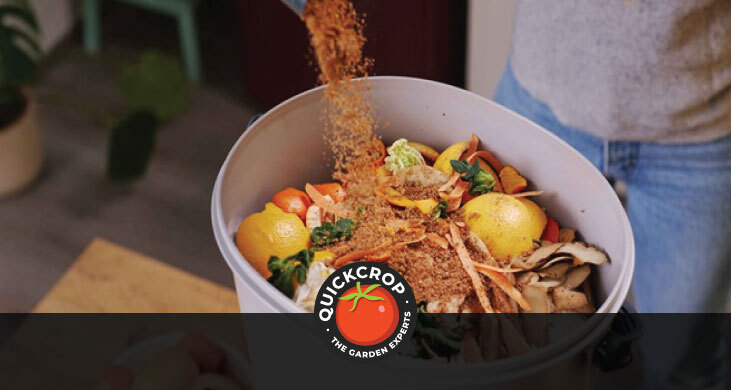
Organko composters are a line of kitchen composting units, made by Slovenian manufacturers Plastika Skaza. They provide an efficient method of processing and recycling kitchen waste. More generally this process is known as 'bokashi' composting, with bokashi being the Japanese word for 'fermented organic matter'.
How Does Bokashi Composting Work?
As some of you will have gathered from that nugget of information, bokashi doesn't work the same way as conventional garden composting. Whereas outdoor composting is a process that requires oxygen (aerobic), with bokashi you are essentially 'pickling' kitchen scraps and food waste in an airtight container (anaerobic).

Organko Essential w/ Base (single)
View ProductWith outdoor composting, decomposition is driven by a natural build-up of microorganisms, insects, and worms. Bokashi composting, by contrast, involves adding a Bokashi 'bran', which can contain billions of microbes.
By the end of this process (2-4 weeks) you should have a mixture of fermented food material with a mildly vinegar-y smell, rather than the crumbly consistency of compost you will be familiar with using in the garden.
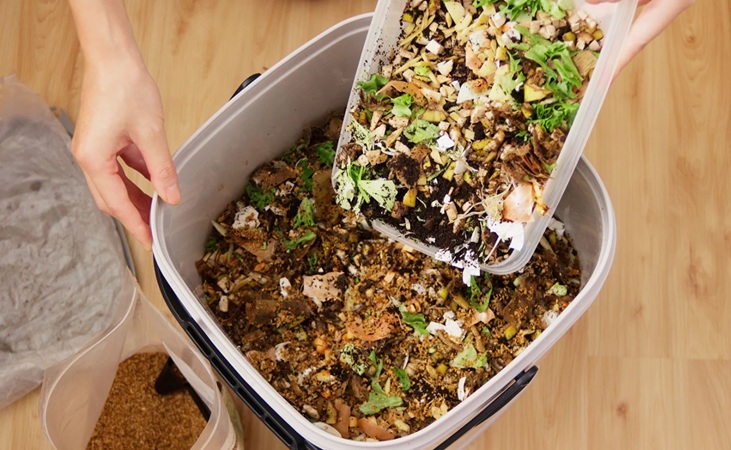
It's important to note that this won't function like finished compost either: it's better thought of as a 'pre-compost' material that can be added to an outdoor composter or pile, or alternatively buried in soil (where it will decompose).
What are the Advantages of Bokashi Composting?
- It doesn't require much space As we will see, Bokashi composters are compact enough to reside on a kitchen counter or elsewhere in the home. They resemble compost caddies, and while some are larger than others, they won't take up much real estate or make a nuisance of themselves.
- Suitable for meat and dairy It's often not recommended to place meat or dairy scraps in a conventional composter/compost pile, although there are exceptions such as sealed hot composters. One of the reasons for this is that the smell can attract rodents, but the Bokashi fermenting process minimises any strong odours - meaning that it's fine to add meat, dairy, fish and so on.
- Fast Processing The fermentation process can often take just 2 weeks - bear in mind that this is still not finished compost, but rather a 'pre-compost' material that can be added to a separate compost pile or dug into soil.
- Enables you to Process Kitchen Waste at a Small Scale Outdoor composting tends to work more effectively when you have a regular supply of organic waste. For, say, the urban flat-dweller who produces a modest amount of food or organic waste, Bokashi can be a good alternative. You could then offer the fermented material to local allotments or gardening groups.
- Doesn't Require Turning A bokashi bin doesn't require any turning, aeration or rotation.
- Finished material will break down much quicker If your outdoor compost pile is being a bit sluggish, adding some Bokashi pre-compost can really speed things along. It is very quick to break down and is likely to increase microbial activity.
Organko Kitchen Containers
We are supplying two different models of Organko composter: the Organko 2 and the Organko Essential (as well as a bin for daily use designed by Plastika Skaza). Both of these containers have very similar characteristics and the overall process is the same; we will describe the differences further below.
They have an unobtrusive, contemporary design that will suit most kitchens, and are made from post-consumer recycled plastics (polypropylene). The containers come with air tight lids, ensuring that the anaerobic fermentation process can take place with the assistance of friendly bacteria.
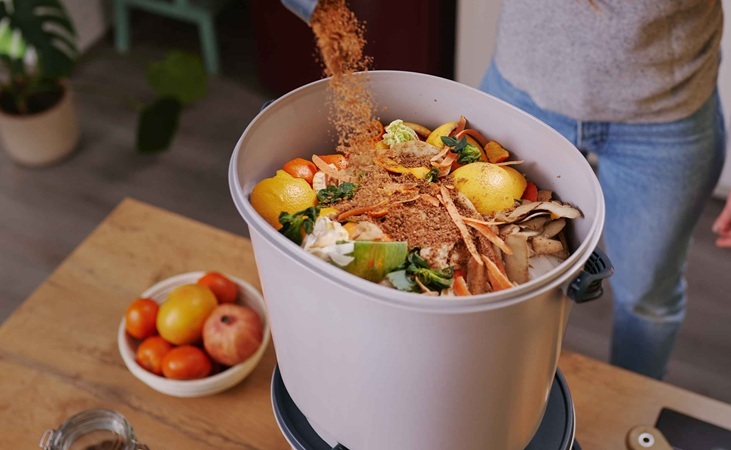
These friendly microbes are added by sprinkling bokashi 'bran' on the mixture. This is a specially designed mixture of microorganisms, water, sugar, and wheat bran; for optimum results it should be sprinkled on each time you add a layer or batch of food scraps.
A liquid byproduct from the fermentation process can be collected using the tap or spigot provided; this prevents the mixture becoming overly sour, but the liquid can also be used elsewhere. Undiluted, this liquid is recommended by the manufacturers as a natural drain cleaning solution, while you can also dilute it and use as a fertiliser for houseplants.
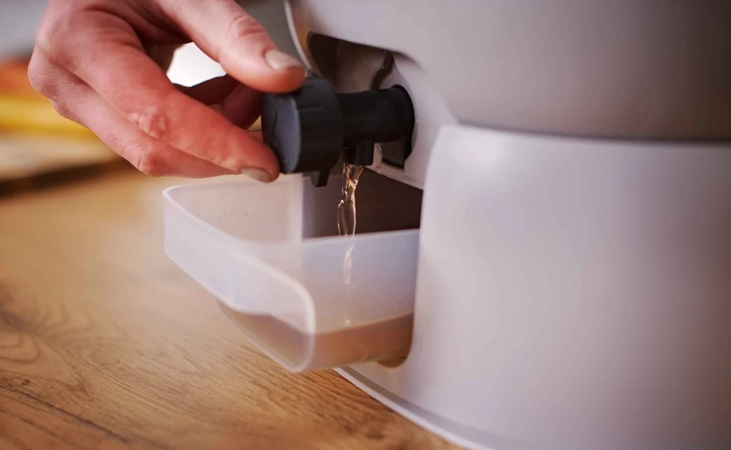
The recycled plastic material is very easy to keep clean, and dishwasher safe up to 55°C or in eco mode.
Organko 2
The Organko 2 is a compact cylindrical container, designed to reside unobtrusively on kitchen countertops or table surfaces. It has a capacity of 9.6 litres. It's recommended to have two of them on the go if possible, as this allows you to keep adding food scraps to one container while the other ferments.

Bokashi Organko 2
View ProductIt's not strictly necessary to do things this way, but once a full container has been left to ferment it's best not to disrupt that process by opening the sealed lid, which introduces oxygen and disrupts the fermentation process. With a second container you can get on with the next batch.
The kit includes a presser for pressing down waste as it's added, expelling air in the process. The Organko won a Red Dot award, impressing as a 'sustainable product solution'.

Organko Essential
The Organko Essential has a larger capacity (15.3l) and is more suitable for families with a more regular supply of food waste.
The Essential has the added benefit of being stackable, so you could be adding food waste to the upper container while the lower container ferments its contents. We've also chosen to stock the Organko Essential with an integrated base, which allows easier access to the tap for collecting the liquid byproduct.

Organko Essential w/ Base (set)
View ProductOrganko Daily
Another winner of the 'Red Dot' award, this compact and eco-friendly kitchen bin eliminates the need for plastic bin bags - and like the above units it can be kept near to hand on the kitchen counter. It features a one-handed easy emptying design.
It's recommended to empty the bin every 1-2 days, but it can depend on how much material you are adding.
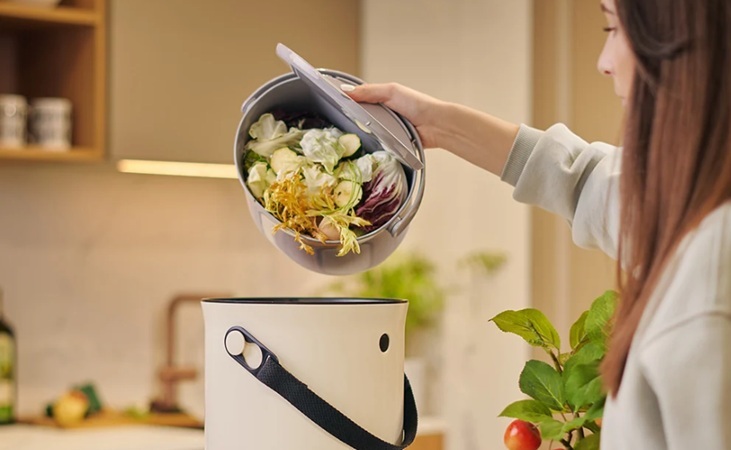
Drawbacks of Bokashi Composting
There are some important things to know or to keep in mind about the Bokashi method. Admittedly we've been using the word ourselves, but strictly speaking Bokashi bins are not composters, and if they're claiming to produce 'nutritious' compost (without some key extra steps that is) they are being misleading.
1 - It Doesn't Produce Finished Compost
Because the way it processes food and organic waste is very different from a traditional composter, the end product is also very different. The material won't have broken down to produce a crumbly, textured soil-like material. Instead, the food scraps will most likely still be identifiable, but the fermented mixture will have a moist texture and a somewhat sour smell.
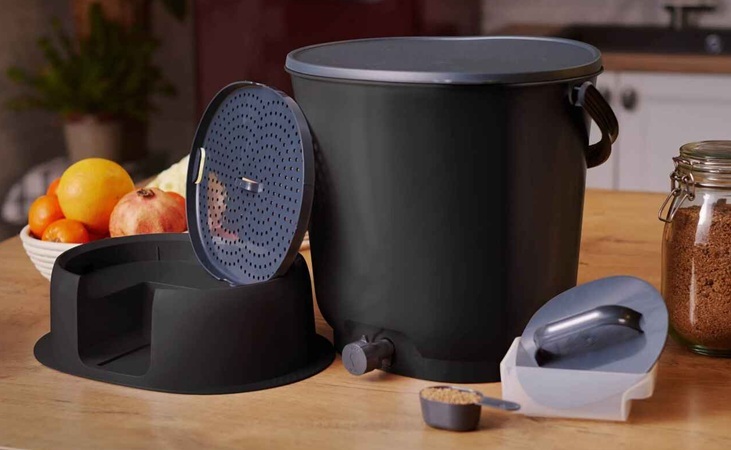
This is more accurately seen as a 'pre-compost' material, and can be buried in soil (where it will break down) or added to an outdoor composter where it will decompose very fast. This extra step may seem inconvenient or not ideal if you are looking for a more self-contained composting method.
If dug into your garden soil, do so at least 2 weeks before planting or sowing any crops, as the mixture is very acidic when it hasn't fully broken down.

Organko Daily Bokashi Bin
View Product2 - The Finished Product Still Needs Getting Rid Of
If you have a spacious enough garden or an outdoor composter, this step may not be a problem. Otherwise, you can offer the 'pre-compost' material to community garden groups or neighbouring allotments.
3 - It is Designed Mainly for Kitchen Waste
Bokashi bins are generally intended for kitchen use, and they will not be as suitable if you have garden debris, leaves, clippings etc to get rid of. It's not a complete composting solution, but one that can work for small space gardens or city dwellers who want to reduce their food waste.
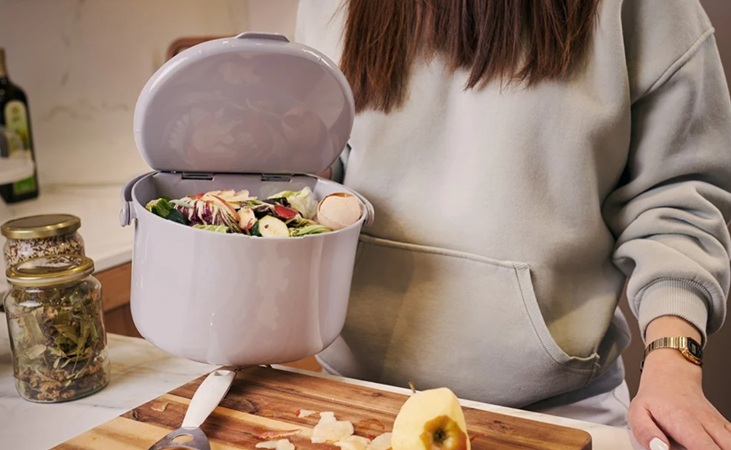
4 - Requires Bokashi Bran
The Bokashi method does involve an extra ongoing expense, namely the Bran which adds microbes. If you're creative enough or willing to experiment, it may be possible to come up with your own DIY solution for inoculating food waste.
To sum up, Organko's fermentation containers have great potential as an alternative to traditional composting: especially for urban living situations or for people who don't have enough organic material to make larger-scale composting viable.
They encourage a zero-waste solution which makes use of unused food scraps that could otherwise end up in landfill releasing gases into the atmosphere.
Citations: "How to Recycle Food Waste with Bokashi." RHS 22 Mar. 2024, https://www.rhs.org.uk/garden-inspiration/get-gardening/bokashi




